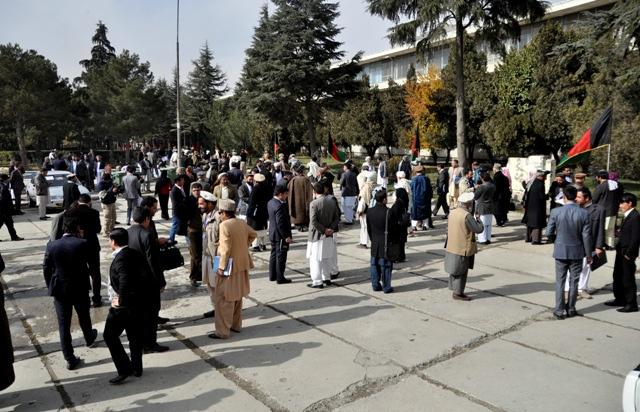KABUL’s long-term interest.
Around 2,500 people’s representatives, tribal chieftains, religious scholars, lawmakers, women tribe, traders and rights activists are attending the four-day grand assembly in Kabul.
On the second day of proceedings, 50 jirga committees started debating the deal, clause by clause. The discussions will continue tomorrow, according to organisers. On the final day, committee heads will present their recommendations before the assembly takes any decision.
Some participants believed portions of the BSA text needed a careful review to safeguard the country’s future interest. The Badakhshan provincial council head suggested changes to the articles concerning civilian house searches and legal jurisdiction over foreign troops.
Abdul Wahid Tayyebi told Pajhwok Afghan News: “If these parts of the draft aren’t amended, I fear Afghanistan will be placed in harm’s way.” However, he hoped the Americans would continue to extend sincere assistance to the impoverished ally.
A representative of the disabled from eastern Laghman province, Syed Sharif, also slammed the jurisdiction clause as violative of Islamic teachings. All parts of the draft agreement that were in conflict with the national interest and inconsistent with the religion must be changed, he demanded.
He viewed the draft accord as detrimental to Afghanistan, because it offered no concrete guarantees of the country’s security and prosperity. US leader Barack Obama’s letter to President Hamid Karzai was also devoid of such commitments, he insisted.
Sharif claimed that the two sides had already concluded the agreement, calling the ongoing tribal forum an exercise in absolving President Karzai of blame and shifting the responsibility for future consequences to the nation.
For his part, Karzai has emphasised on participants to study the entire agreement minutely before sharing their opinion with the government.
Haji Mohammad Usman, a tribal elder from eastern Nangarhar province, insisted sovereignty of the country must be respected; otherwise the agreement would be not approved. The jirga was free of foreign pressures, he said, explaining no one wanted to harm the national interest.
“We have thrashed out more than 10 articles of the pact, but did not find a single article that is against Afghanistan,” he continued.
But an attendee from northeastern Badakhshan province, Mufti Abdul Rahman, condemned legal protection of US forces as a clear breach of Islamic values. Another debatable article concerned house searches, he maintained.
A participant from Balkh province, Nazif Qarizada, noted signing the pact was to the advantage of the country. Afghanistan would face serious challenges if the agreement was not signed, she warned, saying she had studied the whole text but there was nothing negative in it.
Ghulam Hussain Hazara, a political expert and participant of the jirga, opined signing the BSA would benefit Afghanistan in terms of equipping, training and strengthening its security forces. Economic development was another benefit that Afghanistan could gain, he concluded.
mds/mud
Visits: 3









GET IN TOUCH
NEWSLETTER
SUGGEST A STORY
PAJHWOK MOBILE APP